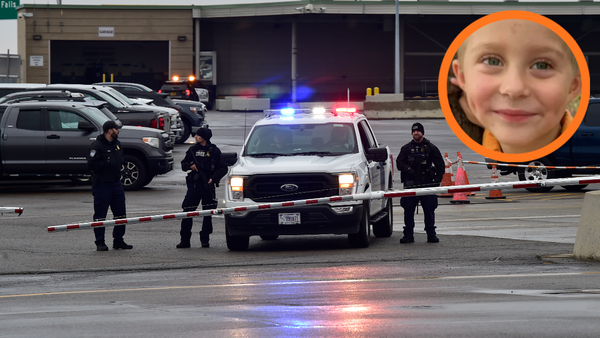
Ramon Price makes sure he’s working on Thanksgiving and Christmas.
He’s a counselor at a funeral home in Oakland, California, where for the past 18 years he’s helped hundreds of families navigate grief, death certificates, insurance and casket selections. About half of them lost loved ones in a homicide, usually with a firearm.
He said the holidays are a particularly difficult time to grieve, not only in the immediate aftermath of killing, but also for years – and decades – to come. Many families cancel their holiday celebrations, while others modify them. He knows because he’s one of them.

In February 2012, his 17-year-old son Lamont Price was killed by gun violence in Oakland. Nearly a decade later, in October 2021, his oldest son, Ramon Price Jr, was shot and killed at age 27 while driving on a stretch of freeway in the San Francisco Bay Area.
It was after Lamont’s killing that Price started working holidays to avoid questions from well-meaning family about how he’s holding up. “I don’t like being around a lot of people now,” said Price, who has eight surviving children and 10 grandchildren. “Most people are conditioned to say, ‘It’ll get better in time.’ I think people do so much out of routine.”
For those like Price who have lost children to gun violence, the end of the year can be especially painful, from the first Thanksgiving dinner without their child, to creating new traditions that help them grapple with the trauma of a violent loss. The Guardian spoke to three other parents who have also lost children to gun violence near the holiday season about what their grief looks like years, and even decades, after loss, and how they’re working to overcome it.
“It’s like if you fall and get a scar,” Price said. “Some scars are there forever, as a constant reminder. But this is one that never heals.”
‘Everything had to be sparkly, shiny’
This year marks the third holiday season Sparkle Davis will spend without her only daughter.
In 2019, 19-year-old Oshiana Thompkins was shot at a Halloween party in Orinda, a small city in the Bay Area. She was one of five people killed in the incident. Since then, her family hasn’t gathered to celebrate Thanksgiving or Christmas together; seeing people hang lights on homes during this time brings up “bittersweet feelings”, Davis said.
“Decorating was something that my daughter loved to do,” she said. “Now, it reminds me of the murders.”
Davis said Oshiana, who she describes as a “glamor girl”, never missed trick-or-treating and showing off her Halloween costume to the neighborhood. On Thanksgiving, she always dressed up for family dinners, and for Christmas, she would decorate their tree with as much glitter as she could find.
“Everything had to be sparkly, shiny, glittery,” Davis said. “She used to always say, ‘Mom, you do it big or go home.’”
Davis said she shut the world out in the six months after her daughter’s killing. She deleted her and her daughter’s Instagram accounts and ignored interview requests from local press.
“I was numb,” Davis said. “I wasn’t washing my face. I wasn’t bathing. I just sat in the living room in the dark.”
One day she says her daughter came to her in a vision while she was lying on her couch. “She said, ‘Mom, I’m OK,’” Davis recalled. “It was like it was real. And from that moment, I started getting my stuff together.”

In the past year, Davis and her family members pooled their money to open a center for students in Richmond, California – Davis and Thompkins’s hometown – to have a safe place to study, play and do art projects after school. Working with the children there gives her some comfort, Davis said.
Still, she’s nervous about the upcoming holiday season, the first time she and her family will celebrate Christmas without Thompkins.
“It’s just so heartbreaking for me I really don’t feel holidays at all any more. But, I know they were something that my daughter loved. So maybe this time around I’ll get back into it.”
For Thanksgiving, Davis and several of her family members reunited for the first time in year for dinner at Davis’s community center. “It turned out really nice,” she said.
‘I’ve learned to deal with the holidays’
For Brenda Grisham, Christmas and New Year’s Eve had always revolved around church. She ran the music department, her daughters sang in the choir and her son played the drums and piano, among other instruments. Each year the family would go to Christmas parties at their church in Oakland and on New Year’s Eve, they attended a night-time service where they would count down to midnight alongside fellow church members.
On the evening of 31 December 2010, as they prepared to go to the service, someone started shooting into a car parked outside the family’s home. Grisham’s oldest daughter and infant granddaughter were sitting inside. Grisham’s teenage son, Christopher LaVell Jones, ran out of the family’s home to try to grab his five month-old niece from the car. The baby escaped injury, but both Christopher and his sister were hit. Christopher’s wounds were fatal.
“His Christmas gift was still in his room, still partially wrapped,” Grisham said.
Every year since then, Grisham, her daughters and grandchildren started a new tradition: getting out of Oakland to spend the last moments of the year relaxing and eating together. “I have PTSD so I go somewhere remote where there aren’t any gunshots going off,” she said of the tradition of shooting into the air to mark the new year.

In the nearly 12 years since her son’s killing, Grisham has become a well-known advocate for parents of murder victims and an outspoken organizer for gun violence prevention. The final months of every year now include going to Washington DC to advocate for crime victims and survivors, feeding unhoused residents during Thanksgiving or taking other parents out of town to events like comedy shows when the anniversary of their child’s death comes around.
She also has a family celebration with her 12- and three-year-old grandchildren who make the days leading up to the anniversary of her son’s killing easier to bear, Grisham says.
“December is not one of my better months but I don’t leave my babies for Christmas,” she said. “I’ve learned to deal with the holidays so it’s not the emotional rollercoaster that I see with other parents. Christmas and the holidays are supposed to be a happy time and they even me out before New Year’s Eve.”
‘Makes me feel good to remember his soul’
For the past 16 years, Georgette Rivera-Leon has maintained the same holiday tradition: going to a convenience store in Santa Ana, California. It was from this shop in the small city about 40 miles south of Los Angeles that her son, Gilbert Rivera, was fleeing as it was being robbed before he was shot and killed.

Georgette Rivera-Leon describes her oldest son as the best Christmas present she’s ever received. He was born on 16 December 1986 and was the oldest of three sons. Every Christmas her son would buy her favorite perfume, Georgette made sure his favorite foods – ceviche, arroz con leche, and hot chocolate – were on the dinner table. Now, friends and family share the hot chocolate that her son loved, and Rivera-Leon makes the pilgrimage to the convenience store to light candles and commemorate her son’s life.
“That’s where I feel him and it’s helped comfort me through the years, because he’s been remembered, not just by us, but everyone who saw his face,” Rivera-Leon said. “That’s my tradition that makes me feel good to just remember his soul.”
While this new tradition is now a source of solace, she said it took years to get there. Celebrating Thanksgiving and Christmas the way Georgette, her husband Oscar Leon and two sons used to was too much to bear, and took time to resume. “It was hard for the boys and my husband and I didn’t know how to act,” she said of the first months and years after her son’s killing. “I was angry and cursing. I couldn’t handle it. It was just too overwhelming, too strong of a pain. I couldn’t handle it alone.”

As the years progressed, Georgette and Oscar welcomed their first grandson, Daniel Gilbert. They resumed their normal holiday celebrations and started setting a place at the dinner table for Gilbert. The family also keeps an open door policy for family and friends to cycle through their home to eat and share stories about Gilbert.
“We do these things because that’s who we are,” Rivera-Leon said. “It took a few years to get started again but it’s our tradition and he’s there with us, even though he’s not here physically.”







